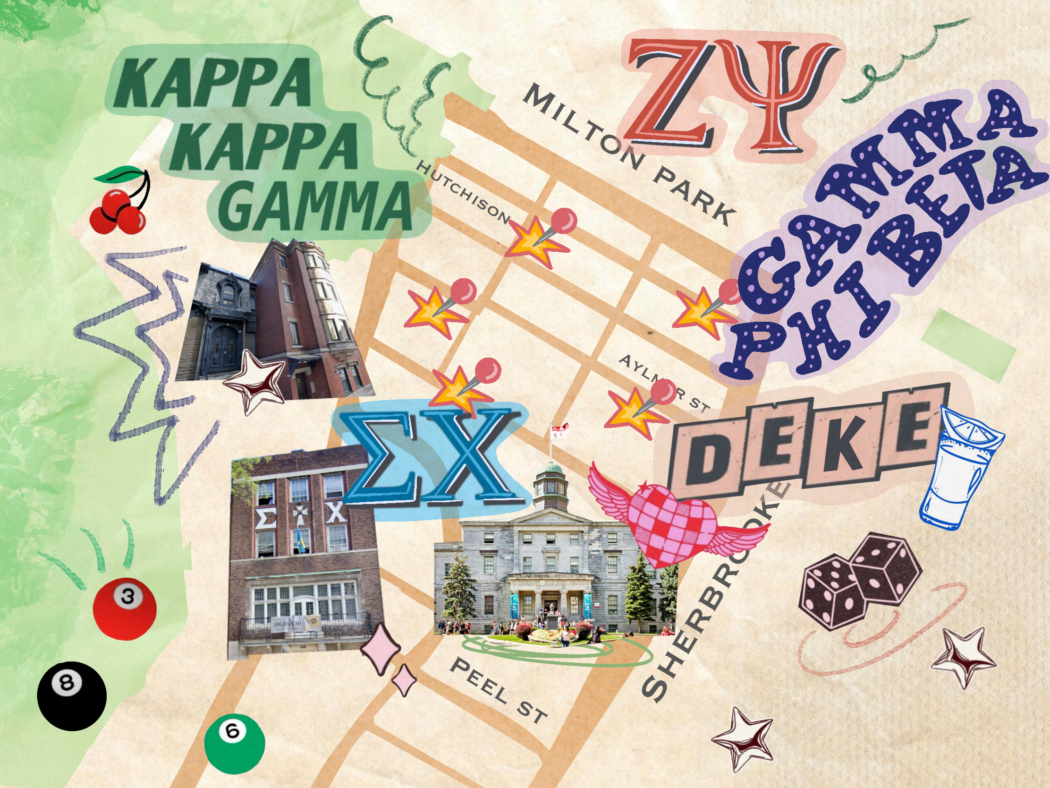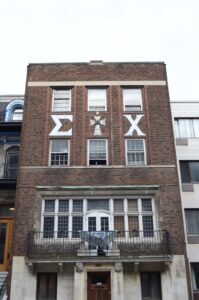The McGill Greek Life scene contains six fraternities and six sororities, which totals over 500 members and represents around 2% of the undergraduate student population. The largest fraternities by membership are Zeta Psi, Delta Kappa Epsilon (DKE), and Sigma Chi. Sororities are slightly smaller, with Kappa Alpha Theta leading in membership, followed by Gamma Phi Beta and Kappa Kappa Theta. Though there is no formal ‘frat row’ at McGill University, Rue Prince Arthur houses Zeta Psi and Gamma Phi Beta, while Sigma Chi’s Gamma Lambda chapter house sits on Rue University. These are a stones throw from Kappa Kappa Gamma’s house on Rue Lorne Crescent. Sigma Chi’s ‘housing corporation’ owns its property while the other ‘Greek Houses’ are rented and typically house 12-15 members.
Fraternities and sororities are often profitable organisations. In 2023, according to one source, Sigma Chi generated over $1.1 million across all their chapters; the larger Greek organizations have tens of millions of assets under their name. However, this isn’t the case with all fraternities. Zeta Psi, with notable alumni including Senator and two-time Presidential candidate John McCain, experienced a nearly 30% reduction in total revenue from 2018 to 2019. As a result, the fraternity has been forced to increase dues for active members of the fraternity. which may cause financial uncertainty amongst its members, with an increase of dues reported at 10-15% for 2020-2021. The average price of membership per semester at McGill fraternities is usually capped at around $400-500, usually decreasing based on seniority.
Alumni are a potential attractor for students who are considering fraternities or sororities, as having business executives, lawyers, doctors, and public figures could help students build their network. As a result, these organizations can boast lucrative connections and offer opportunities to work or intern in similar desirable and competitive fields. Kasper Leonard, a U1 student at Columbia University in New York and member of Alpha Epsilon Pi, mentioned to The Bull & Bear how fraternities offer a “streamlined networking opportunity for those looking to go into finance,” explaining how bankers of leading financial institutions such as Deutsche Bank, Credit Suisse, and Bank of America often pass by his chapter to answer questions. Kasper warned that “you still have to be proactive and it is 99% in finance,” leaving many other fields excluded from a fraternities’ rolodex of connections.
McGill University and Sigma Chi alumnus, Saf Hakawati, who is now studying law at Université De Montréal told The Bull & Bear that “fraternities offer networking possibilities that transcend simple networking where the mentee doesn’t have much of an interest in whether they want to hire you or not.” However, he also mentioned how networking isn’t the primary function of fraternities, as brothers are more focused on “building each other up.” This includes philanthropic events and fundraisers including ‘Derby Days,’ a yearly event where sororities complete challenges known as ‘Scunts’ with fraternities and make posters to win the title of ‘Derby Queen,’ raising money for charities.
An active brother of Sigma Chi, Leon Houssine, who serves as the current House Manager of Sigma Chi, articulated how being in a fraternity offered an “increased network,” adding that these networking opportunities “depend on the frat.” Leon completed an institutional credit internship at BNP Paribas during the 2023-2024 summer cycle but added that this wasn’t solely due to his membership in Sigma Chi.
There is also a significant support structure available at fraternities and sororities in preparing applications for internships or post-graduate jobs. Sigma Chi offers the “career advantage” program which claims to “provide knowledge, tools, resources and connection opportunities for both our undergraduate and alumni members as they build their lives and careers.” This includes resume advice, mentorship, and general career advice which is available 24/7. Greek life members simply upload a copy of their resume onto the online portal; advice is available 2-3 days after submission from specialists in that field.
Furthermore, some fraternities boast a large membership among particular industries: fraternities such as DKE and Zeta Psi have a significant contingent of their chapter enrolled in the Desautels Faculty of Management. An anonymous source from DKE commented to The Bull & Bear on how “we have alumni everywhere, including my home town of London, UK where I had a coffee chat with an alumn who now works at Goldman Sachs.”
Hierarchy and fraternities seem to be interconnected. New York Times columnist David Brooks mentioned how “fraternity and sorority life is about learning how to play the game of hierarchy,” with there usually being a President (leader), Pro-Consul (deputy leader), and an executive committee who structures the organization’s interests. At McGill, there is no exception –- a member of Sigma Chi, Boris Ostin even mentioned how “being in the executive committee is an undeniable honour.”
Greek Life may also be affiliated along religious lines. Concordia sorority Alpha Epsilon Phi and McGill fraternity Alpha Epsilon Pi both identify as Jewish and have strong connections with the Jewish community in Montreal. The larger fraternity also offers events such as the “International Convention,” hosted at the Waldorf-Astoria in New York City to meet alumni. An attendee and member of Alpha Epsilon Pi at McMaster University, Ben Growberg mentioned to The Bull & Bear how “I met Jewish leaders from different walks of life and I was especially thrilled to meet a political representative working at the White House.” Later that year, Ben received news that he had been accepted to the competitive White House Internship under the Biden-Harris administration.
Greek Life at McGill has a darker side too. Horrific reports of gang rape at a Zeta Psi party in 1988 and date rape in the 1990s continue to pose problems to frat parties. An anonymous source mentioned to The Bull & Bear how they “felt unsafe” at a Halloween frat party, adding how they could “constantly feel [themselves] being observed” and noting how “it seemed to be an extremely unchilled environment.” Sororities have also been critiqued for playing into fraternities’ interests with Joan B. Johnson writing in ‘Feminist Review’ about how they perpetuate “femininity that is more about spectacle and pleasing others than about authenticity.”
On a lesser note, McGill Greek Life has also faced criticism for being “pretty un-fratty” by Nicolas Takawski, an undergraduate and active brother of Beta Alpha Omega at Dartmouth University. He explained to The Bull & Bear how “frats in Canada need to get their numbers up if they are to be considered serious.” Recently, there has been a noted drop in overall fraternity membership, with the National Interfraternity Council (NIC) reporting a 15-20% drop in fraternity membership post-covid. For some, joining a fraternity is seen as more of a gamble rather than a guarantee for internships and job placements. Dr. John D. McFarland, President of the North American Interfraternity Council, stated, “While fraternities can offer some networking benefits, the reality is that many internship programs today prioritize a candidate’s academic achievements, relevant experience, and diversity of interests over extracurricular affiliations.”
Greek Life is not a new concept at McGill, with the first fraternity, Zeta Psi, established in 1883 only 60 years after the founding of the university. For many, such as Zac Shoan, an undergraduate student majoring in Political Science, “Greek life seems to be a dying breed” that “no longer appeals to me.” Zac considered joining a frat briefly in the 2023 fall rush. Greek Life continues to provide invaluable networking opportunities for some, however, it seems to be increasingly questioned and challenged by those ‘on the fence,’ like Zac. As the academic environment of McGill changes, Greek Life seems to be caught between its storied past, uncertain present, and the evolving student body’s attitudes of the future.










